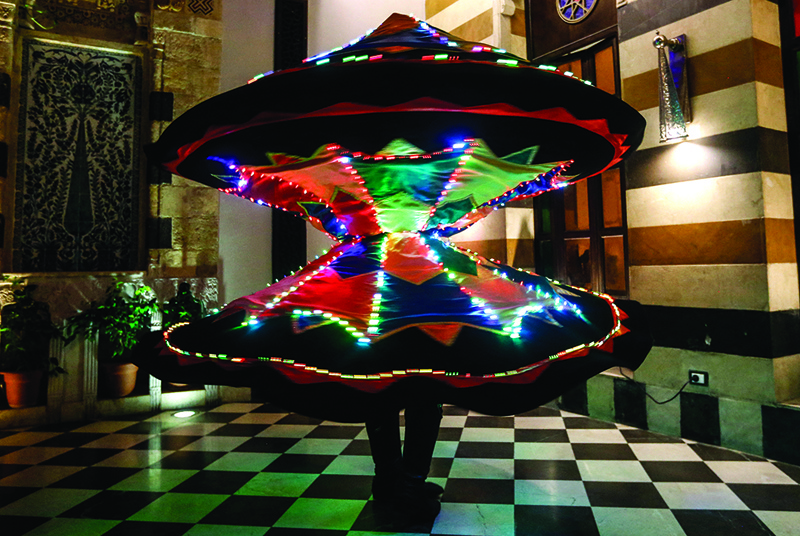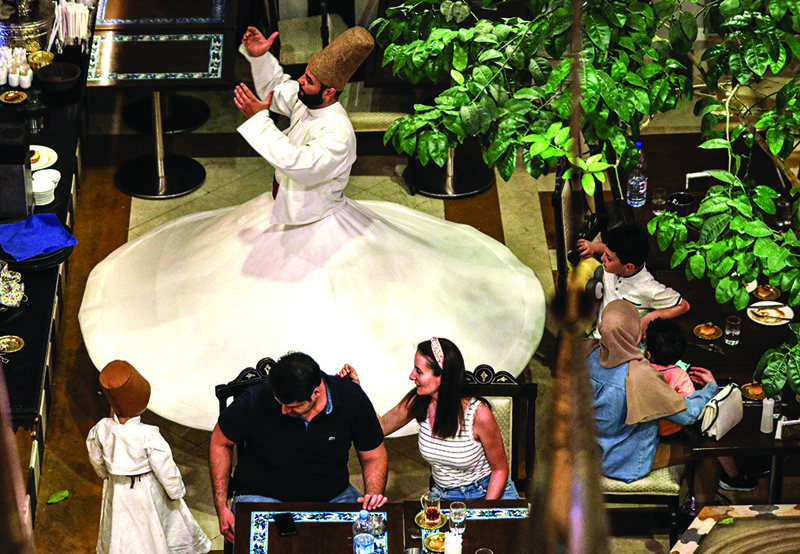 Sufi Dervish dancer Muayad Al-Kharrat, 28, dances with his lit dress at a restaurant in the Shahgur district of the old city of Syria's capital Damascus. — AFP photos
Sufi Dervish dancer Muayad Al-Kharrat, 28, dances with his lit dress at a restaurant in the Shahgur district of the old city of Syria's capital Damascus. — AFP photosThree-year-old Anas Al-Kharrat gracefully raises one hand to the sky as his long white robe twirls around his tiny spinning body. His dancing skills run in the family-his dervish dancer father Muayad is whirling next to him, in front of a spellbound audience. "Anas learnt to whirl before he learnt to talk," his father said, speaking inside a Damascus restaurant. "He is the youngest dervish dancer in Syria". Whirling-a sort of moving meditation through which Sufis seek to commune with the divine-sees performers twirl to the hypnotic rhythm of prayer, until they reach a trance-like state.
Popular in Iran, Afghanistan and Turkey, the dance emerged alongside Sufism-a spiritually focused approach to Islam, founded by followers of 13th-century Persian mystic and poet Jalal Al-Din Rumi. The Kharrat family is one of the most reputed in Damascus, and boasts 20 dervish dancers who often perform during the Islamic holy month of Ramadan. Muayad started twirling as a child, taught first by his grandfather, then his uncle and finally his father. At 28, he now owns a fragrance shop in a popular Damascus market, but his real passion lies in Sufi spiritual practice. "Sufism in general is a means to worship and exaltation," he said. "Whirling is just one way of reaching God."
 Sufi Dervish dancer Muayad Al-Kharrat, 28, dances with his lit dress at a restaurant in the Shahgur district of the old city of Syria's capital Damascus.
Sufi Dervish dancer Muayad Al-Kharrat, 28, dances with his lit dress at a restaurant in the Shahgur district of the old city of Syria's capital Damascus.'Humility'
Muayad said he can twirl dozens of times per minute "without moving an inch away from the axis". In war-wracked Syria, whirling offers relief from the woes of a conflict that has been exacerbated by a dire economic crisis and the coronavirus pandemic, he said. "Whenever I feel distressed... I confine myself to my room, and turn and turn until I feel at peace." In the living room of their Damascus home, Muayad pulled a long white robe over Anas's head before helping him with a matching jacket and a tall burgundy felt cap.
Around them stood relatives in matching outfits and similar "sikke" caps, which can be brown or black and are designed to emulate the stick shape of the first letter of the word God in Arabic ("Allah"). They then descend a long staircase towards a courtyard, to practice whirling to the rhythm of prayer with Muayad's brother Mahmoud. The 34-year-old is teaching the children how to hold their arms while twirling. "By raising our arms we are begging for mercy from God and sending a prayer to the heavens," Mahmoud said, gesturing toward the sky. "Placing our hands against our chest is a sign of submissiveness and humility before God."
 (From left) Sufi Dervish dancers Yasser, Anas, and Muayad Al-Kharrat, members of the Kharrat family, dance at a restaurant.
(From left) Sufi Dervish dancers Yasser, Anas, and Muayad Al-Kharrat, members of the Kharrat family, dance at a restaurant.Ramadan special
Before the outbreak of the Syrian conflict in 2011, Mahmoud performed in several European countries, and even toured the United States. "We spent more time outside Syria than inside," he said. Travel restrictions imposed on Syrians due to the conflict brought the family's performances abroad to a halt, forcing them to keep up the tradition by performing at local events. "We have performed in restaurants and weddings," Mahmoud said. Evening performances during Ramadan "are one of our last hopes" to make a living, he added.
The holy month is a busy time of year for whirling dervishes, who perform for audiences sipping coffee or smoking shisha in cafes and restaurants after a day of fasting. Almost every popular spot in the capital offers some form of dervish performance to attract customers. "We eagerly await the month of Ramadan to share this ritual with people," said Mahmoud. "Whirling is for every time and place, but it is even more spiritual during Ramadan". - AFP
 Sufi Dervish dancer Muayad Al-Kharrat, 28, dances at a restaurant.
Sufi Dervish dancer Muayad Al-Kharrat, 28, dances at a restaurant.









